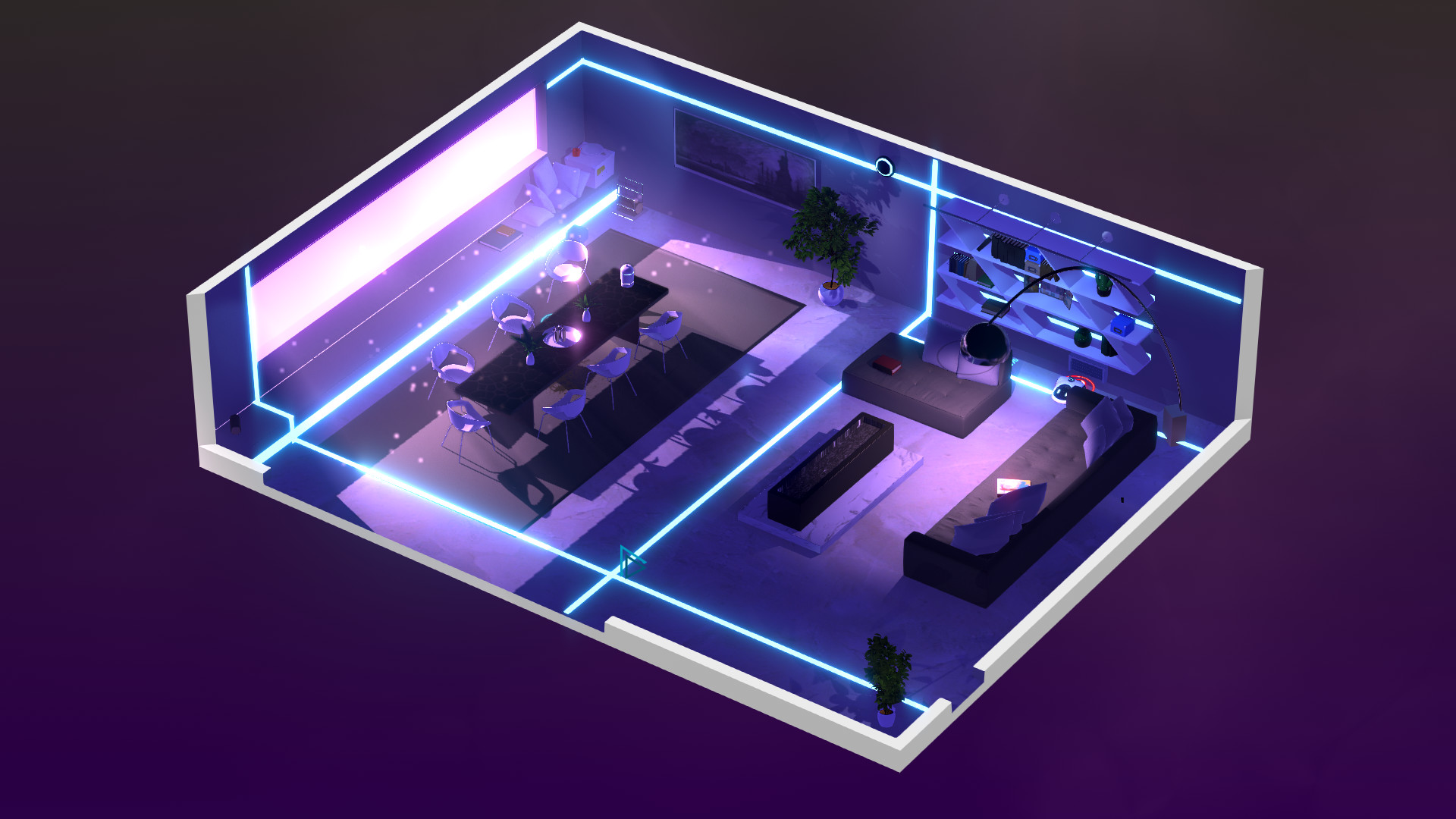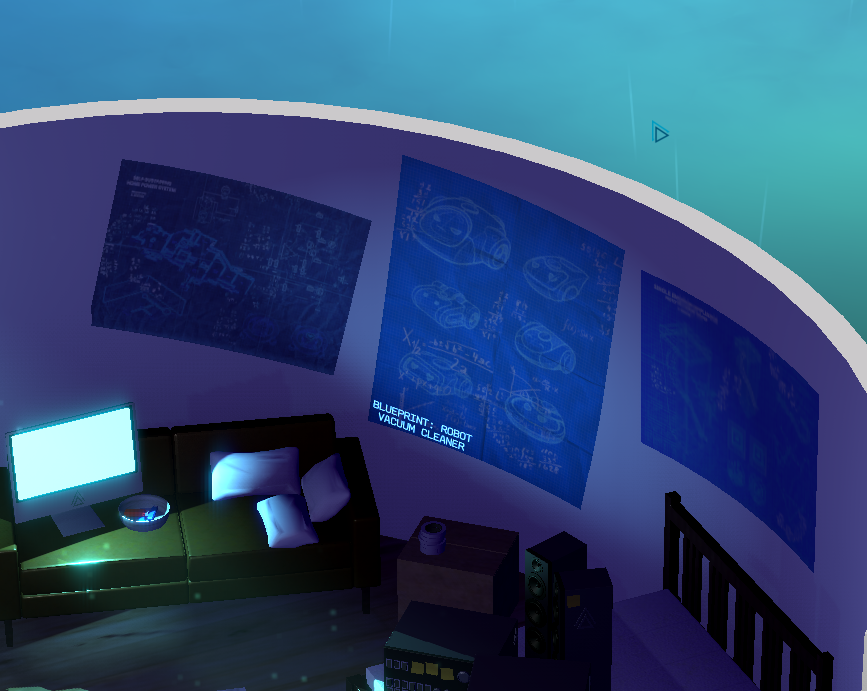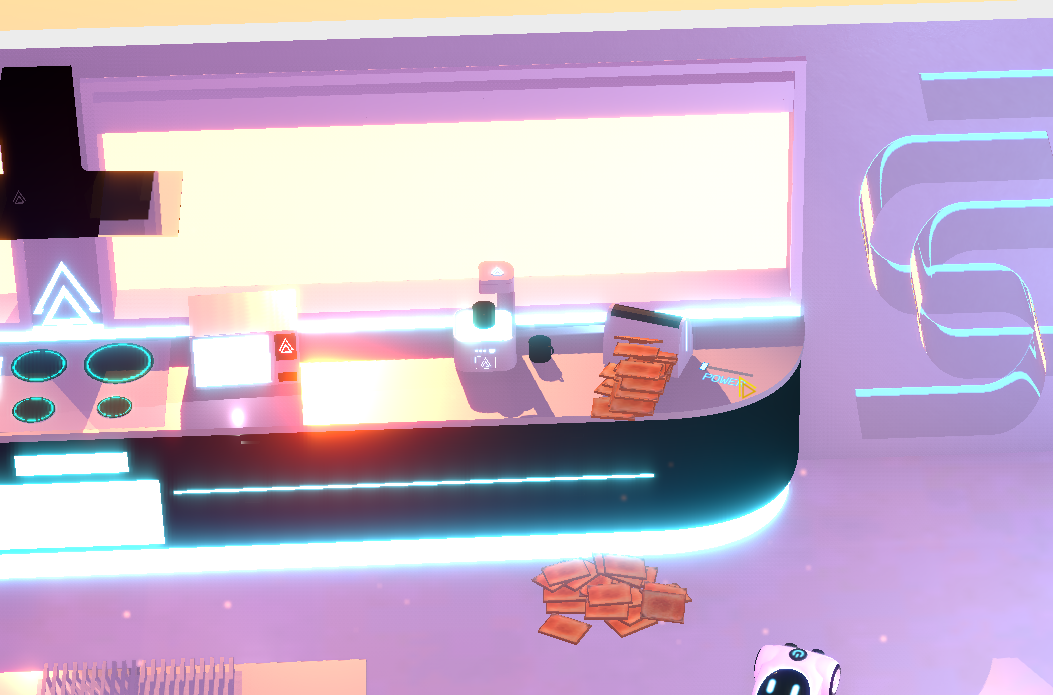Rumu loves cleaning. Wine. Toast. Ada the cat’s paw prints. It doesn’t matter. Anything to keep the house sparkling for David and Cecily – the smartest, clumsiest humans in the world. David might leave his shirts lying around. Cecily might drop her teacup. Rumu doesn’t mind. Rumu loves to clean, and knows that people make mistakes. They are, after all, only human… Rumu knows this, because Rumu is incredibly smart for a vacuum cleaner. Smart enough to follow instructions from the house AI, Sabrina, who Rumu also loves. Smart enough to make decisions, too, even though Rumu was built for a single purpose. Still, as Sabrina puts it, one must question the efficiency of branching dialogue capabilities for a device designed to feel only love.
Rumu knows this, because Rumu is incredibly smart for a vacuum cleaner. Smart enough to follow instructions from the house AI, Sabrina, who Rumu also loves. Smart enough to make decisions, too, even though Rumu was built for a single purpose. Still, as Sabrina puts it, one must question the efficiency of branching dialogue capabilities for a device designed to feel only love.
Algorithms to Live by
If a few of Rumu‘s more – ahem – human personality functions lack efficiency, though, the UI and design here are elegant to the point of being surgical, with all the uncanny detachment that word implies. Interactivity prompts and other information retain a sleek, diagetic implementation throughout. Gorgeous lighting effects compliment a domestic-cyberpunk aesthetic, and the isometric tearaway floor plans suggest the omnipresent gaze of a functionality-obsessed observer. The streamlined, internet-of-things kitted domicile is believable first as home, second as beatific workspace in the LED eyes of the busied beholder.

I feel personally attacked
A brief instruction manual to get the most out of your Rumu device: The game, at its dustbag heart, is a point and click adventure. Your interaction takes the form of discovery, password solving, and some very light environmental puzzles. There is one short, reflex-based section very late into the game, and it’s excellent – though not for any of the reasons you might expect. Rumu is not especially concerned with mechanical challenge, or mastery over a specific set of skills. It is concerned with making you feel like a sentient vacuum cleaner. Here, it absolutely succeeds. In inhabiting Rumu, you are playing as a device that finds unparalleled joy in mundane drudgery. There is such simple beauty to the way these tasks are presented to you that you will come to crave them, and cherish the eerily flat, sing-song compliments Sabrina rewards you with upon their completion. They are, after all, what gives you purpose.
Rumu to Maneuver
This distillation of character into mechanics also extends to controls, although here, it’s somewhat of a double-edged vacuum attachment. You control Rumu via either directional keys or mouse controls. While the former is a tactile and believable representation of how you might imagine it feels to be a sentient vacuum cleaner, neither are particularly smooth. Rumu rarely requires manual dexterity, so the cumbersome controls are forgivable. Still, it’s disappointing that the overall polish doesn’t quite extent to navigation. Ultimately though, the interactivity here succeeds because it informs the narrative, and Rumu is a narrative experience, first and foremost.

You’ll likely begin to understand the central question at Rumu‘s core after a short while playing, because it’s not a new question. Not new to science fiction, and not new to videogames. What makes Rumu so surprising, then, is how engaging and original its treatment is of what is perhaps the biggest cliché in stories dealing with sentient AI. Rumu is an episode of Black Mirror written by Douglas Adams. It is bleak, touching, oddly profound, and hilarious, sometimes all at once. It touches on ethical AI, object orientated ontology and the IoT, with themes as far reaching as anthropomorphic Shinto and linguistic determinism. An understanding of none of these is required to be moved by it, however. Underneath its casing, Rumu is about humanity; about obsession and family and hubris, as terrifying as it is beautiful.
Your Plastic Pal
A word on length, and price: A single playthrough of Rumu will take you roughly 3 hours. There are reasons to replay, although I can understand this being an issue at the current price tag. The game absolutely succeeds in what it attempts, and the polish and talent poured into its creation are clear from the outset. If you decide Rumu is for you, you’re paying for a near flawless execution of a very specific vision, not a campaign to pour dozens of hours into.

In Rumu, the everyday becomes the existential; the banal becomes the sublime. It’s a game where something as simple as putting away dirty laundry might cause you to question the boundaries of emotional agency, the ethics of programming sentient machines, and the nature of humanity itself. As Rumu‘s owners might put it: I never knew it was possible to love an appliance this much.

Pros:
- Cohesive, inspired vision that extends to narrative, mechanics, and visuals
- Sleek, stylish, and slightly unnerving aesthetic
- Rumu is loveable af
- Mood greatly enhanced by an absorbing and measured soundtrack
- Top notch toast physics
Cons:
- Occasionally awkward controls
- Short length for the price
- Fate of waffle iron uncertain.
Conclusion:
So long, and thanks for all the toast.




The moment when you want to give an ai a much needed hug.
[…] On Rumu […]